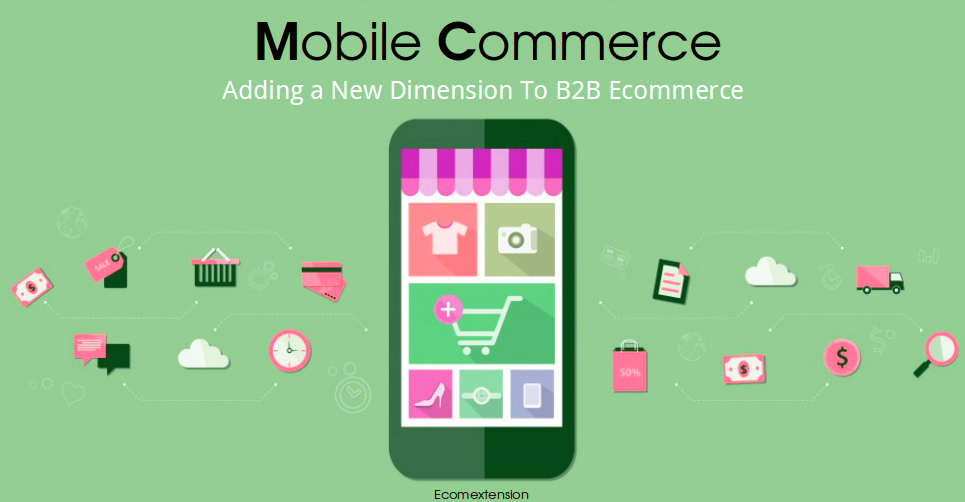
“80% of internet users owns a smartphone,” according to the global web index.
In the last decade, the exponential rise is observed in the mobile users and its adoption by the varied industry leaders.
Understanding the move of the market, online retailers have also embraced the m-commerce strategy to make their presence felt on mobile.
Extending the reach to the mobile users has turned out to be great for the retailers in B2C commerce. Traffic volume, sales, conversion, customers’ loyalty and revenue have shoot up.
Now, mobile is making inroads into B2B commerce!
According to Frost and Sullivan research, “Globally, by 2020 the B2B Ecommerce market will be twice as large as the B2C market – $6.7 trillion vs. $3.2 trillion.”
Yes. Akin to Ecommerce customers, Ecommerce suppliers also prefer to fulfill customer’s demands on mobile, instead of laptop/desktops.
The extension of B2B Ecommerce to mobile would provide new opportunities to the suppliers in the form of the app features such as mobile payment, customers’ feedback, social media promotion, push notification and so on.
It enables the suppliers to work outside the box anytime, anywhere.
Recognizing the significance of mobile in B2B Ecommerce, the well-renowned online marketplace like Amazon and Alibaba already have a mobile app in place for B2B Ecommerce.
How about you? Do you want to build a mobile app for B2B Ecommerce? Before you say YES, let’s take a look at how mobile commerce development for B2B Ecommerce is beneficial for you:
1) Enhancing B2B commerce store
Suppliers have to glue to their desk to view the dashboard, manage payment options, check order records, and optimize the product catalogs.
But, mobile apps set them free. Suppliers can easily update the product catalog, confirm the orders, approve customer’s demands, and manage the transactions and sales while on the move.
The mobilization of B2B commerce enables suppliers to respond in the real-time, which improve customers’ experience and good word of mouth about the supplier.
Additionally, suppliers can personalize the dashboard and modify the layout in a few clicks.
2) Integrate third party tools
Mobile technology has provided a myriad of tools and technologies that has speed up the working. Implementation of the tools, power up the mobile app efficacy.
For instance: Integrating Google wallet, Apple pay or Square, suppliers would allow the customers to pay online during checkout using any wallet that ends the hassle of taking out plastic cards from the pocket and ease the shopping.
Besides, using mobile GPS feature, push notifications/messages are sent to the customers of a particular location in the real-time.
3) Open up new marketing and advertising opportunities
Mobile has added a new frontier to the product marketing. Online businesses are making perfect use of this platform to run their marketing campaigns efficiently. This way B2B Ecommerce can also squarely send the ads as a notification/message on the device that always stay close to the customers.
Moreover, it provides one more opportunity to the retailers to send the tailored promotional messages in a timely fashion.
For instance: When the notifications reached to the customers based on the location, search history, and previous purchases, they feel like getting the notifications for what they are searching, which enable impulse buying.
4) Get the exact info out of the data
Advanced technology has provided an array of tools with which suppliers can easily extract and tap into the customers’ data to better know how to reach the customers at different touch points.
The tools illustrate every detail like- how customers use the app? Where they spend most of the time?Which features they browse more? And so forth.
By collecting and making sense out of the data, suppliers would come to know what customers feel about the UI/UX design, navigation, products and more, and they can strategist accordingly.
The precise data and facts are the goldmines for the suppliers with which they can do wonders, if used aptly.
Conclusion
B2C Mobile Ecommerce made the buying easy and B2B Mobile Ecommerce enable suppliers to better comprehend how they can make the buyers buy the products easily.
It’s impressive!
Now, it’s time to upgrade your B2B Ecommerce to B2B Mobile Ecommerce. So don’t wait anymore and begin your mobile Ecommerce development right away.


